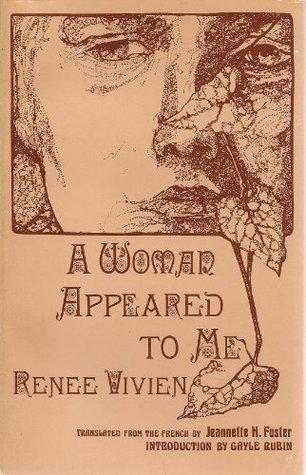“She drew closer to me. Her entire being was in revolt against the horror of the real, against the ugliness and the baseness of the real” (24).
A Woman Appeared to Me was published in French in 1904, rewritten and republished in 1905, and is presented here as a pair, in a sensitive but quirky translation by the late, great science-fiction novelist and obsessive translator of decadent literature Brian Stableford. The novels are one part extended meditation on gay desire, one part overwrought symbolist prose poem, and one part bitter, misandrist recounting of the author’s relationship with Natalie Barney—irresistible American heiress and blonde heartthrob of the turn-of-the-century Paris lesbian scene.
“I hate Vally [Natalie] passionately. I would see her suffer with delight; and yet I would give my brain and my blood to spare her the slightest anguish. I can do no more. I love her” (212).
Unsurprisingly, Natalie Barney was unimpressed by her portrayal, written when the lovers were no longer on speaking terms: “When I re-read those two novels,” she said, “I get the unpleasant feeling of having posed for a bad portrait artist” (xvii).
“Lorely [also Natalie] was, by turns, a Byzantine princess, a young English lord whose slim build and fine clothes François I might have noticed in the Field of the Cloth of Gold, an unhealthy and cruel infanta, a wandering minstrel without any other wealth than his harp. ... Feverishly, she chose and rejected fabrics and jewelry. ‘I’m always similar to myself,’ she sighed” (27).
The 1904 version is far superior. My impression is that Vivien rewrote the novel, first and foremost, as a kind of apology to all the people she had insulted. In cutting what was hurtful, she also cut much of what grounded the novel; the material that made it feel like someone’s life, rather than a dream. But there is something to be said for reading both, for seeing many of the best passages recontextualized, the symbolism refined, the misandry toned down, the novel’s doubling become quadrupling. I read the 1905 version first and the 1904 version second, as they are printed here and as Stableford recommends. This, too, makes sense—the 1905 version is a fever dream that the 1904 version extends and enriches. But it is a risky choice, to read them in that order—because if you were only to read one, 1904 is far and away the one to read.
“‘Never follow advice, even one of those that I give you. Every individual ought to live their personal life and pay dearly for the experience that proves nothing’” (121).
Overdone and underdeveloped—and yet the novels have a sensitivity, an intensity of feeling, that makes them feel like indispensable landmarks in the history of queer literature. I love their open celebration of Lesbian desire and of women’s beauty; their open disdain for men, marriage, and motherhood; the charged symbolism that justifies their lack of structure and story.
“‘I believe that the Unnameable, the Incomprehensible, is a double thought, a hermaphrodite thought. Everything that is ugly, unjust, ferocious and cowardly emanates from the Male Principle. Everything that is dolorously beautiful emanates from the Female Principle’” (132).
Perhaps most of all, I love the novels’ peculiar blend of hedonism and spirituality. To be a woman who loves other women, for Renée Vivien, is the highest expression of the human soul. It is pure pleasure and pure sorrow. Only the language of God, of religion can do it justice.
“‘I’ve loved to the limit of my strength,’ I said, defending myself. ‘No one has the right to ask any more of a human being’” (240).

